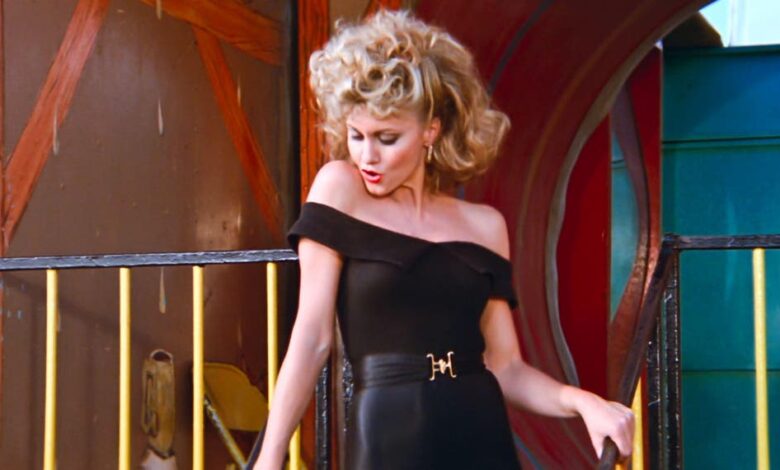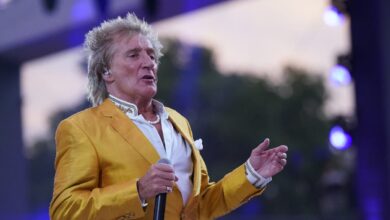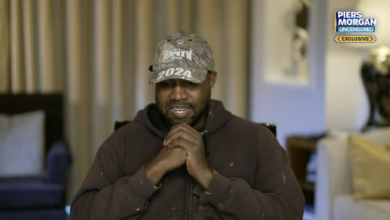‘Olivia held John’s hand through it’: The unlikely story behind Grease’s electric soundtrack

When John Farrar turned up to a movie set at dawn clutching a demo of his hastily written “emergency song”, he didn’t have high hopes. The call had only come in the previous day, crying out for a last-minute number to plug a hole in the musical score for when the greaser with heart gets the good girl turned bad. Farrar hadn’t exactly been inspired in scratching it together – “desperate is probably the word”, he says. The director took one listen and hated it, but the last-day-of-school shot was already set up and they were all out of options. A choreographer threw together a dance routine on the spot. The scene went in the can inside seven hours, and so wrapped this hokey teen musical presumably bound for oblivion.
Or not. The movie was the 1978 musical smash Grease. The track, “You’re the One That I Want”. A year later Farrar’s “emergency song” would hit No 1 across the world as the 6 million-selling second single from a soundtrack that would go on to become one of the biggest albums of all time, released 45 years ago this week. “It was one of those lucky things, being in the right place at the right time,” Farrar says today. “I still don’t know why it was such a hit. It affected young people greatly, it seems. I just happily watched from the sidelines in amazement.”
It’s bizarre to think that the iconic dance scene around a fairground funhouse might have been scrapped altogether if the lead actor had not loved the song. “[Farrar] came into my trailer at, like, six in the morning, because he had been up all night,” Olivia Newton-John said later, recalling the day her character Sandy would swap the goodiest of two shoes for the most sprayed-on of trousers to win over John Travolta’s tongue-lolling cool kid Danny. “He played it for me and said, ‘What do you think?’ I went, ‘Oh, God, it’s amazing.’ It just had this fantastic energy.”
Farrar, Newton-John’s regular producer and songwriter throughout her rise in the Australian country pop ranks, has good reason to thank his systematic, nay hydromatic stars. It might have been Henry “The Fonz” Winkler crawling up the funhouse stairs after Marie Osmond, had the former not turned down the Danny Zuko role to avoid being typecast and the latter not dropped out for fear of damaging her squeaky-clean image by crushing a cigarette beneath a six-inch heel and purring, “Tell me about it, stud”.
Tell you more? Grease originated as a stage musical conceived by advertising copywriter Jim Jacobs and art teacher Warren Casey, both am-dram regulars in Sixties Chicago. The pair dreamt up the musical after the sound of Led Zeppelin blasting from speakers at a wrap party made them pine for the doo-wop of the 1950s. Combining their own high school experiences – Jacobs was a greaser, Casey a studious do-gooder – they concocted a gritty Fifties rock’n’roll teen musical peopled by gangs of slick-haired drag racers, Pink Ladies, and beauty school drop-outs. Grease opened in Chicago in 1971 and, on the back of jitterbugging classics like “Summer Nights”, “Greased Lightnin’” and “We Go Together”, proved a touring hit. Theatre producer Allan Carr caught it off Broadway in 1972 and smelt cinematic junk food. Five years later, once the film rights came free and Carr had become a name at Paramount thanks to his success in marketing the plane crash cannibalism flick Survive!, Grease was greenlit as a lowbrow punt on a budget of $6m (£4.8m).
The casting process alone speaks to the movie’s ramshackle construction, soundtrack included. After Winkler declined the offer of essentially making Fonzie: The Movie, Paramount turned to 22-year-old rising star Travolta. A one-time T-Bird in the touring show of Grease, Top Ten recording artist and star of ABC sitcom Welcome Back, Kotter, Travolta had been signed up for a three-movie deal with Carr’s co-producer Robert Stigwood: the first would be Saturday Night Fever. Similarly, Donny Osmond and Elvis were both rumoured for the role of the malt shop Teen Angel before it ultimately fell to Frankie Avalon. And Sid Caesar’s role as Coach Calhoun was originally given to porn star Harry Reems of Deep Throat fame.
For Sandy, producers considered Marie Osmond, Carrie Fisher and Susan Dey of The Partridge Family before deciding on the 29-year-old Newton-John, who was initially wary of taking the part. An inexperienced actor with a couple of flop movies behind her (most ignobly 1970’s sci-fi turkey Toomorrow) she was, Farrar says, “kind of nervous that she was older than the part”. Newton-John was also concerned that the throwback genre might harm her wholesome, Grammy-winning pop career. “I was very anxious about making another film, because my music career was going well,” she told Vanity Fair in 2016, having admitted to Record Mirror in 1981 that she was “very frightened of losing my traditional following in the States” where she had “almost been a country singer”.
Travolta championed her, however. “She had a brilliant voice, and I didn’t think there could be any more correct person for Sandy in the universe,” he told Vanity Fair, likening her genius casting to giving the role to Taylor Swift today. “I never let up on it.” Travolta used his influence to his own advantage, too. In the stage production, rock’n’roll centrepiece “Greased Lightnin’” was sung by the T-Birds’ baddest bad boy Kenickie, but Travolta fought to be the one belting it out in the film adaptation. “I wanted the number,” he said. “And because I had clout, I could get the number.”
Farrar got his big Grease break when Carr decided to enhance the romance between Danny and Sandy and evoke a more Californian Fifties vibe – malt shacks, palm trees, drive-ins full of shark-finned cars. Some of the stage production’s less schmaltzy songs were backgrounded or dropped altogether. Rizzo’s “There are Worse Things I Could Do” was almost axed until Stockard Channing, playing the part at 33 years old, convinced Carr that the tune was the emotional heart of the film. “Allan was very wishy-washy on the song,” she said. “He thought it was a downer.”
The shift required a clutch of new songs. Barry Gibb was hired to pen the title track and Louis St Louis and Scott Simon contributed Travolta’s stranded-at-the-drive-in ballad “Sandy”. Newton-John suggested Farrar try his hand on a heartstring tugger for Sandy. “They needed a solo song for her,” he recalls. “Olivia suggested that I have a shot at writing it, so I wrote ‘Hopelessly Devoted to You’ and they liked it, so they put that in. It took me quite a while to come up with; I think I spent about three weeks trying to write that one. What I did with my songs was try to do the Fifties style but bring it up to date a little bit, sound-wise and arrangement-wise.”
Part of the appeal of the Grease soundtrack, indeed, was the slathering of classic Fifties doo-wop and rock’n’roll songs in the bombastic, post-Wall of Sound orchestral production of Seventies cinema. But for everyone involved, Grease was a workaday sort of commission. Guitarist Jay Graydon, one of the pool of session musicians called in to LA’s Sunset Sound and Wally Hadler’s studios over five or six days to hammer out the soundtrack, remembers being surprised that Farrar was lowering his usual “middle to high IQ” songwriting in order to do the project. “I said, ‘You dumbed it down a little bit for this, huh?’ He said, ‘Hey man, it was really hard to write this stuff,’” recalls Graydon. “I said, ‘I get it, you had to keep it dumbed down but that’s not you, you’re musical’. He didn’t write past the money. With a hit record that’s not complex, guys like John and myself, you don’t want to write past the money. That’s the line.”
In producing “You’re The One That I Want”, however, Farrar found real on-tape chemistry between his star couple. “When John came in for ‘You’re the One That I Want’, apparently he was quite nervous about doing it,” he says, having sensed a tension in the studio at the start of the sessions. “He was a bit wary of me, he didn’t know me, but Olivia came in and sort of held his hand and he did an incredible job, even better than I thought he would do it. He produced the little yodel on the ‘You’re the one that I want’ line that I wanted. It was quite a high song, and he was great. She was great with him. I don’t know whether I could’ve pulled that off without her there.”
When Grease was panned by critics on its release in June 1978, it was ultimately the songs – and primarily the pop-heavy new tunes – that made it a phenomenon. Ahead of the release, Gibb’s title track topped the US charts in May and “You’re the One That I Want” was an even bigger hit worldwide. Further singles “Hopelessly Devoted…”, “Summer Nights”, “Sandy” and “Greased Lightnin’” swiftly became family disco mainstays and classic radio favourites, catapulting the soundtrack towards a reported 28 million sales and making the film, back in 1978, the highest-grossing screen musical of all time.
Success didn’t instantly translate to respect. Farrar recalls “Hopelessly Devoted…” being pipped to the 1979 Academy Award for Best Original Song. “I think it was considered to be a pretty run-of-the-mill song and the Oscar was won by ‘Last Dance’ [from disco comedy Thank God It’s Friday], which was the happening thing at the time. But I think now the song has remained pretty credible.”
“Those songs that were needed for the movie and the scenes and the demographic they were shooting for, it was perfect,” says Timothy May, another of the session guitarists on the album. “It was bubblegum kinda fun, but it was well played and the songs were great. They were exactly right.” Even Graydon, listening back to the soundtrack today, is surprised at the music’s “high IQ”, and agrees that the Grease soundtrack – the Fifties chrome-plated, fuel-injected and four speed to the floor – deserves to ride the flying car to soundtrack legend.
Frankie Avalon performs ‘Beauty School Drop Out’ in ‘Grease’ (1978)
“It holds up because of that style of writing, that classic old doo-wop, simple rock’n’roll,” he says, adding that for a simple three-cord song, “Greased Lightnin’” is an unexpectedly complex number. “The stuff holds up. They’re all classic songs.” A-well-a-well-a-well-uh-huh.
It was bubblegum kinda fun, but it was well-played and the songs were great. They were exactly right
Olivia Newton-John and John Travolta in ‘Grease’ (1978)





